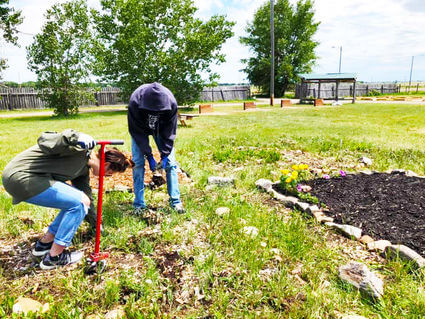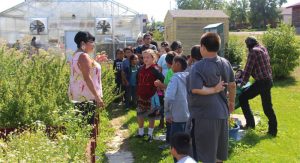Located in North Central Montana near the Canadian border, the 675,000-acre Fort Belknap Indian Reservation is home to 7,000 members of the Gros Ventre (Aaniiih) and the Assiniboine (Nakoda) Tribes. The primary industry on the Reservation is agriculture.
Activities
The Fort Belknap FRTEP extension program has operated on the Reservation for more than 30 years and has played an integral role in helping tribal members to acquire skills and knowledge through the program’s education and outreach efforts that serve the needs of families, producers, businesses and industry. The program has more than 40 partnerships with other agencies, specialists and tribal programs.

Highlights
MEASURING IMPACT
-
“…the agent got a livestock sale going here….and the main thing is the Ag workshops she brings in during the wintertime for ranchers and farmers to attend, that are good workshops. They’re about financing, and different production methods with good presenters…”
FRTEP programs have had a major impact on individuals, families and tribal communities. Just how much impact has now been quantified thanks to a research project that used Ripple Effects Mapping (REM) and content analysis. The Indian Land Tenure Foundation (ILTF) engaged in a joint collaboration with an evaluation team and the Western Extension Risk Management Education Center to measure the long-term impacts of the Federally Recognized Tribal Extension Program (FRTEP) serving the Fort Belknap Indian Reservation. Click the link below to read the report.
Healthy lifestyles
Montana State University extension classes in cooking, sewing, gardening and other healthy lifestyle topics are always well-attended. Extension has done produce safety training to help local growers learn good agricultural practices, food safety and environmental management. Direction and resources have been provided to local businesses on planning for healthy lifestyles. As a result of efforts by extension agents, families that previously had little access to vegetables now have more fresh options sold locally.
Food sustainability
Fort Belknap extension’s efforts toward food sustainability have continued to increase in scope and participation. Many more people have started home garden plots, the community gardens are thriving and food preservation programming has been expanded. An effort is under way to develop high-density fruit growing, including apples, grapes, pears and plums. The school has begun work on cultivating a large squash and corn plot. Horticulture training has been popular and young people have received training in safe canning techniques for meat preservation.
Rancher Roundup and Producer Outreach
Fort Belknap extension conducts educational outreach workshops for cattle producers on a variety of topics in conjunction with local agriculture leaders and outside experts. Topics include business management and finance, marketing, farm planning and renewable energy. The goal is to provide producers with opportunities to resolve their everyday challenges and obstacles by providing knowledge and resources that can improve their farming and ranching techniques.
Youth Development
Youth and families have opportunities to participate in learning activities year-round. The Mid-Winter Fair has been held annually for 50 years and it offers youth the opportunity to share their dancing, singing, storytelling, drumming and art. From cooking contests to Fiddle and Jig Night, the Stick Game Tournament and a traditional pow wow, the Fair is a popular event every year.
During the summer the community garden provides opportunities for youth to learn first-hand about agriculture. They participate in cooking classes and also engage in garden tasks through the summer youth employment program. Students in grades 4-6 at the Lodge Pole School participate year-round in 4-H activities which are connected with classroom learning.

Contact Information
Elizabeth Werk – Extension Educator
Phone Number
406-353-2656
ewerk@montana.edu